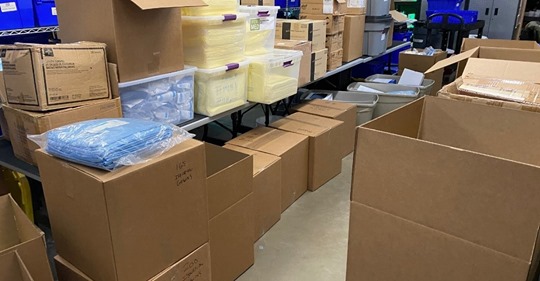NBC Chicago TV Dramas Donate Med Gear To Real Coronavirus Heroes

NBC Universal donate medical masks used as TV props on NBC’s “Chicago Med,” “Fire” and “P.D.” to real-life coronavirus first responders.
CHICAGO – NBC producers of “Chicago Med,” “Chicago Fire” and “Chicago P.D.” pulled off a three-show crossover to help combat a real-life pandemic crisis.
Producers, a prop master and network executives collaborated to donate a stockpile of medical-grade protective equipment used as props on all three hit prime-time dramas to the real-life doctors, cops and paramedics on the front lines of the new coronavirus outbreak.
The effort started with a call for help to “Chicago Med” associate producer Dr. Andrew Dennis — a Stroger Hospital trauma surgeon and Illinois State Police medical director.
“I got a critical call from one my former [medical] residents in Rockford who said they had nothing, and we were able to get them 20 or 30 N95 masks and 100 disposable gowns,” Dennis said. “It turned out we had thousands of N95 masks, thousands of surgical masks, a thousand disposable gowns and hundreds of boxes of gloves.”
There’s such a shortage of N95 respirators — which are so named because they are able to block at least 95 percent of 0.3 micron particles — that Vice President Mike Pence asked construction companies nationwide to donate their masks to hospitals in need.
Locally, the Illinois Health and Hospital Association called on dentists, veterinarians and construction workers to donate face masks and respirators to first responders treating COVID-19 patients.
With filming halted, Dennis and his “Chicago Med” co-workers teamed up to get the personal protective gear out of storage and into the hands of COVID-19 first responders.
“Chicago Med” prop master Chris Shader rounded up and inventoried the gear from the sets of all three shows. Producer Carla Corwin got the donation approved by NBC Universal executives. And Dennis coordinated delivering the equipment to the Illinois public health and emergency management departments.
“We know everybody needs the personal protective equipment, but the question is which need is the most critical,” Dennis said. “So, we thought the best way to handle disbursement was to get it in the hands of the state to make sure it goes to the truly vetted, most critical need. That’s the goal.”
IDPH was set to pick up the protective gear at Cinespace Chicago Film Studios, where all three shows are filmed.
